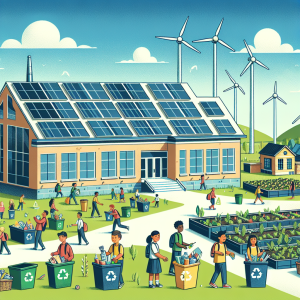Choosing the right location is paramount when planning to build your own off-grid home. A site with access to abundant natural resources such as sunlight, wind, and water can significantly enhance your home’s sustainability. Ensure the land has suitable soil for supporting a well or rainwater collection system. Proximity to natural vegetation can offer additional benefits such as shade and wind protection. However, building regulations and zoning laws need thorough review, as they often dictate what can be constructed and where.
The design of your off-grid home plays a pivotal role in its efficiency and comfort. To optimize energy use, incorporate passive solar design principles that maximize natural heat during colder months and minimize it during warmer times. Position windows strategically to optimize natural lighting and ventilation. Thermal mass elements like concrete or stone can absorb and store heat, further regulating indoor temperatures. A compact, simple layout minimizes construction complexity and material costs.
Installing a reliable energy system is crucial for a truly off-grid existence. Solar panels are a popular choice due to their decreasing costs and increasing efficiency. Accompany them with a robust battery storage system to ensure power availability during nights or cloudy days. Wind turbines offer an additional energy source in gusty areas, while micro-hydro systems can be highly effective if a consistent water flow is accessible. A hybrid approach utilizing multiple energy sources provides maximum reliability.
Establishing an independent water supply is essential. Digging a well is a traditional method; ensure it penetrates an aquifer for a reliable water source. Alternatively, implement a rainwater harvesting system, capturing rainfall from rooftops into cisterns. Equip your setup with filtration systems to ensure water potability. In areas prone to shortages, a greywater system can recycle wastewater for gardening or flushing toilets, reducing total consumption.
A self-sufficient off-grid home must also address waste management. Composting toilets are an excellent option, turning human waste into usable fertilizer while avoiding the need for plumbing or sewage connections. Ensure your sanitation solution meets local regulations, which may require the installation of a septic tank. Managing kitchen waste through compost bins not only reduces landfill contribution but provides nutrient-rich material for gardening purposes.
Heating, ventilation, and air conditioning (HVAC) systems should also consider off-grid requirements. Choose energy-efficient appliances that leverage your solar or wind systems. Wood-burning stoves offer traditional heating solutions using renewable resources. Additionally, ensure proper house insulation to conserve energy. Double-glazed windows, sealants, and weather stripping reduce heat exchange significantly, maintaining a stable internal climate.
When considering construction materials, prioritize sustainability and local sourcing. Reclaimed wood, recycled metal, and earth-based materials reduce environmental footprints. In addition, straw bales or adobe bricks provide excellent insulation while being renewable and cost-effective. Employing a green roof can further enhance thermal performance while supporting local biodiversity.
An essential aspect of living off-grid is growing your own food. Design a garden plan that accommodates fruits, vegetables, and herbs suited to your climate. Using permaculture principles can create a self-sustaining, low-maintenance garden. A greenhouse extends your growing season, while vertical gardens maximize space utilization. Integrating livestock like chickens or goats can supply essential proteins and dairy.
Internet connectivity in an off-grid home is certainly attainable. Satellite service providers offer reliable connections without relying on traditional infrastructures. Alternatively, cellular broadband solutions can connect rural areas, though coverage must be verified. Maintaining digital connection ensures access to modern conveniences like remote work, telemedicine, and online education.
Remember, building skills are fundamental when constructing an off-grid home. Learn basic carpentry, plumbing, and electrical skills, or consider enlisting professional assistance for technical installations. Workshops, online tutorials, and community colleges offer learning opportunities. Partnering with like-minded communities or professionals experienced in sustainable living can provide invaluable assistance and advice.
Finally, consider the emotional and psychological aspects of living off-grid. It can be an enriching lifestyle choice, fostering independence, a connection to nature, and a heightened sense of sustainability. However, it also demands resilience, adaptability, and a proactive problem-solving attitude. Embracing off-grid living requires lifestyle shifts that prioritize energy conservation and self-reliance, ultimately offering a rewarding, sustainable way of life free from the constraints of traditional utility systems.




